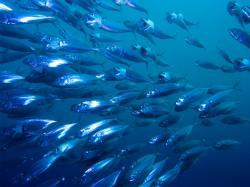Scientific Analysis Confirms MSC Certified Seafood Harvested From Healthy Stocks
August 28, 2012 | 4 min to read

The first comprehensive analysis of fish stocks targeted by MSC certified fisheries has concluded that stocks are healthy and well-managed to ensure continuing sustainability.
The results confirm that MSC certification accurately identifies sustainable fisheries, and that the MSC ecolabel – currently appearing on over 15,000 products worldwide – continues to provide shoppers with reliable information about the health of fish stocks.
Gerd Hubold, scientist at the German von Thünen Institute of Agricultural Trade Policy and World Nutrition and former General Secretary of ICES, (the International Council for the Exploration of the Sea), adds: "The sources and methods used in this study are internationally recognised and robust and its results are straightforward. To me the study shows that the MSC ecolabel is indeed a trustworthy mark for sustainably exploited fish stocks."
David Agnew, MSC director of standards, said: "The research examined key indicators of stock health over time and compared the performance of certified stocks against non-certified. Stocks targeted by MSC certified fisheries were in general more abundant, and harvested less intensively, than those targeted by non-certified fisheries. The MSC welcomes critical reviews of its program such as this."
Detailed comparison of certified and non-certified stocks enabled by RAM database
The research paper, ‘Ecolabel conveys reliable information on fish stock health to seafood consumers’ was published today in the peer-reviewed scientific journal PLOS ONE. Led by the MSC and co-authored by independent scientists from universities around the world, the study is the most detailed and rigorous quantitative assessment to date of certified, wild-caught seafood in relation to the biological sustainability of targeted stocks. It compares catch data, fishing mortality rates and population levels for all stocks where this information was available – a total of 45 MSC certified and 177 uncertified stocks. The majority of data relating to stocks targeted by non-MSC certified fisheries was sourced from the publicly accessible RAM Legacy Stock Assessment Database, the largest global stock assessment database, which was augmented by newer stock assessments where available.
The study’s key findings include:
- The majority of MSC certified fisheries are maintaining stocks at high levels: nearly three quarters (74 per cent) of certified stocks are at or above the level that ensures the stock is at its most productive, compared with less than half (45 per cent) of uncertified stocks.
- The fish stocks targeted by MSC certified fisheries have increased in abundance at a far faster rate than non-certified over the last ten years – an average growth of 46 per cent for certified stocks compared with just 9 per cent for uncertified. The cause of these differences is twofold. Although in some cases the increases have been generated as a direct response to conditions imposed through MSC certification, in others an already well-performing management system, with increasing stock abundance and favourable environmental conditions, has created the conditions whereby a fishery could be more easily certified.
- No stocks targeted by MSC certified fisheries are overfished. That is, where overfished is defined as the population below a safe biological level, at which point the stock may struggle to reproduce and repopulate itself – the standard international definition. The one stock (Iberian sardine) which has been shown, in the annual audit required by the MSC certification programme, to have fallen below this sustainable limit since its original assessment and certification, has had its MSC certificate suspended until the fishery can demonstrate clear improvements in the stock levels.
- A small group of stocks targeted by certified fisheries are depleted (below the target population level that would secure maximum productivity, but above the safe biological level for that particular stock). The fisheries targeting these stocks have strict plans in place to reduce catches and rebuild stocks back to desired levels. For example, North Sea haddock has experienced a reduction in fishing mortality of more than 40 per cent in the last 5 years, resulting in stock rebuilding despite weak recruitment.
Nicolas Gutierrez, manager of the MSC monitoring and evaluation programme and lead author, said: "We recognise that stock status and harvesting levels are not the only measures of a fishery’s sustainability. However, the ability of a fishery to identify and respond to changes in stock status is critical to maintaining the resource at renewable levels. MSC certification requires fisheries to amend their harvesting strategies to rebuild stocks where necessary, and the effectiveness of such management actions are closely monitored through annual audits.
Methodology and data
The research team compiled a database of 45 MSC certified stocks and 177 uncertified stocks for which the population level likely to produce maximum yields (MSY) is used as a management target. This excluded some species, such as salmon, for which management objectives are not based on a simple calculation of MSY. It also excluded fisheries assessed under a risk-based framework (mostly small-scale and data-limited fisheries). The sample of stocks analysed was weighted towards fisheries from developed nations where stock assessments are regularly carried out. About 85 per cent of MSC certified landings (about 8.0 million tonnes) was represented by the stocks analysed in this study.
MSC evaluates environmental benefits of certification
The analysis and monitoring of the status of fish stocks under the MSC programme is part of a broader monitoring and evaluation strategy aimed at implementing statistically rigorous indicators of the programme's effectiveness, and particularly at evaluating the environmental benefits of MSC certification.
David Agnew added, "The MSC believes in the critical importance of a science-based, data-driven monitoring system. Our aim in undertaking this and other such research is to clearly document the changes that are happening in MSC certified fisheries, to increase the effectiveness of our programme, and to increase the understanding of fishery systems globally."
Source: Marine Stewardship Council
